“Looters become looted, while time and tide make us mercenaries all.”
—Patrick Rothfuss, The Wise Man’s Fear
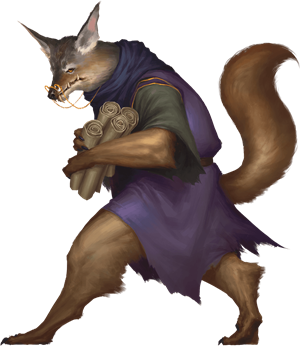 The Blood War consumes the Lower Planes. It exists in the back of every fiend’s mind—save for those so tormented that rational thought is beyond them, such as manes and lemures. So far, this series has given advice on how to play the creatures serving on either side of the Blood War: devils fighting for tyrannical order and the stability of the Nine Hells, and demons fighting for utter chaos and the endless hunger of the Abyss. There are fiends that exist outside of this dichotomy of law versus chaos. Some of these neutral fiends defy classification, such as succubi and incubi, hell hounds , and nightmares. These fiends often have some sort of loose allegiance (such as incubi to the Demon Lord Graz’zt and nightmares to their devilish narzugon riders, but there are fiends that exist outside of the hierarchies of demons and devils entirely.
The Blood War consumes the Lower Planes. It exists in the back of every fiend’s mind—save for those so tormented that rational thought is beyond them, such as manes and lemures. So far, this series has given advice on how to play the creatures serving on either side of the Blood War: devils fighting for tyrannical order and the stability of the Nine Hells, and demons fighting for utter chaos and the endless hunger of the Abyss. There are fiends that exist outside of this dichotomy of law versus chaos. Some of these neutral fiends defy classification, such as succubi and incubi, hell hounds , and nightmares. These fiends often have some sort of loose allegiance (such as incubi to the Demon Lord Graz’zt and nightmares to their devilish narzugon riders, but there are fiends that exist outside of the hierarchies of demons and devils entirely.
These fiends, called yugoloths, are denizens of the Bleak Eternity of Gehenna, a lower plane aligned to the cosmic forces of neutrality and evil. Souls that act selfishly, greedily, cruelly, or that commit purposelessly evil acts are often consigned to an afterlife in Gehenna. These souls become yugoloths. Like demons and devils, yugoloths take many forms, which reflect the powers their evil spirits have developed in their new lives. Legend says that the yugoloths were first created by a sisterhood of night hags, and that these hags were commissioned by Asmodeus to create an army of fiends that could fight eternally within the Nine Hells. The story of the yugoloths and their creation is told in greater detail in their entry in the Monster Manual.
As the yugoloth civilization grew and spread across Gehenna, it eventually began to spread across other planes, and now the planes of Gehenna, Carceri, Hades, and Acheron exist under at least partial yugoloth hegemony. As they spread across the multiverse, conquering as they went, yugoloths began to be approached by mortals and extraplanar beings alike who sought their martial talents. Over the eons, since the first contract was forged with a yugoloth warlord, these neutral evil fiends have earned a reputation as the finest mercenaries in the multiverse.
Yugoloth mercenaries are expensive beyond most mortals’ imagining, and they are self-serving to a fault. They lack both the extreme unpredictability of demonic hordes and the strict orderliness of diabolical legions. In a phrase, yugoloths are selfishness embodied.
Summoned yugoloths demand much for their time and loyalty. Whatever promises a yugoloth makes are quickly broken when a better opportunity presents itself. Unlike demons, yugoloths can be reasoned with, but unlike devils, they are rarely true to their word.
—Monster Manual
Yugoloths are employed most frequently by Asmodeus and the other Lords of the Nine, whose ill-gotten wealth vastly exceeds that of any mortal nation. Also, though demons often seem like mindless beasts, many of them possess an alien cunning—and some yugoloths are brave enough to approach them in search of lucrative employment. Since yugoloths can’t be permanent killed outside of their home plane of Gehenna (they simply dissolve into ichor and reform on Gehenna when killed elsewhere), they can fight without fear of consequences in any battlefield across the multiverse. This fearlessness, combined with their unmatched martial skill, allow yugoloths to raise their mercenary rates to unimaginable heights—and for warlords across the cosmos to pay them, nonetheless.
Yugoloths in the Nine Hells
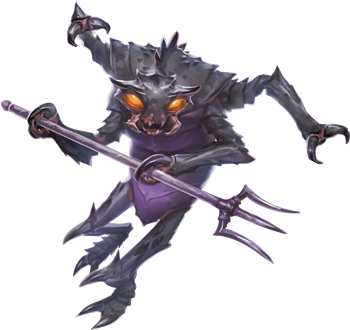 If you’re playing Baldur’s Gate: Descent into Avernus, or creating an adventure of your own that takes place in Avernus or another hot spot of the Blood War, yugoloths will help you add dimension to the battles between devils and demons.
If you’re playing Baldur’s Gate: Descent into Avernus, or creating an adventure of your own that takes place in Avernus or another hot spot of the Blood War, yugoloths will help you add dimension to the battles between devils and demons.
While exploring Avernus, any demons you meet are most likely hostile invaders, willing to kill anything that moves—except other demons. Devils could be either soldiers in Zariel’s legions, or members of her army in other ways, serving as war machine mechanics, bureaucrats, sentries, or any number of other roles. Yugoloths have only a single role in Avernus—mercenary—and a single goal: acquiring wealth. They may serve devils, demons, or even mortals, but their true loyalty is always to themselves above all others.
When a character meets a yugoloth in Avernus, the yugoloth likely thinks three things before taking action.
- Who are they? Does my contract require me to destroy them or protect them, or neither?
- Will my employer reward me if I destroy them or protect them?
- Will it benefit me to destroy them or protect them—or to create a new contract with them?
If the yugoloth’s outlook is neutral towards the characters, it likely attacks—it is a cosmic embodiment of evil, after all! However, unlike a demon which fights to the death, a yugoloth knows when it’s beaten, and flees or surrenders. A yugoloth that surrenders might even try to make a deal with the characters, offering a reduced rate in exchange for sparing it the embarrassment of being bested by mortals. If a yugoloth is hostile towards the characters, it fights to the death, unless it thinks it can get a better deal out of the characters. Yugoloths have no sense of loyalty to their employers, and if its enemies can offer a higher rate, it will jump ship in a heartbeat.
Dealing with Yugoloths
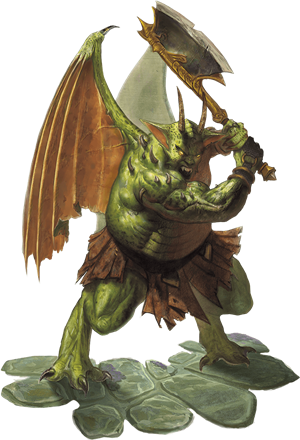 Baldur’s Gate: Descent into Avernus has a full appendix dedicated to describing how to make deals with devils. Infernal contracts are often tricky, written exclusively in Infernal, and filled with predatory clauses designed to fool you into giving up your soul. Yugoloths are much more straightforward. Some yugoloths desire souls—as a fell ritual powered by mortal souls can resurrect a yugoloth destroyed on Gehenna—but most are content to deal in gold and other material valuables.
Baldur’s Gate: Descent into Avernus has a full appendix dedicated to describing how to make deals with devils. Infernal contracts are often tricky, written exclusively in Infernal, and filled with predatory clauses designed to fool you into giving up your soul. Yugoloths are much more straightforward. Some yugoloths desire souls—as a fell ritual powered by mortal souls can resurrect a yugoloth destroyed on Gehenna—but most are content to deal in gold and other material valuables.
A rule of thumb you can use when a character wants to purchase a yugoloth’s mercenary services is to multiply the yugoloth’s challenge rating by 100. The result is the amount of gold pieces a yugoloth charges per day of service. Most yugoloths only enter into contracts if their services are needed for a tenday or more—but if a contractor needs only a single task completed, the yugoloth will bill them for a full day. When entering into a mercenary contract with a stranger, many yugoloths demand half payment up front, with the other half due upon completion of the task.
If the being that purchases the yugoloth’s services can’t pay its fee in full upon completion, the yugoloth has several means of recourse. Most times, yugoloths simply kill employers that can’t pay up. Other times, wizardly yugoloths such as an arcanaloth will use magic to turn the debtor into its thrall until it pays off its debt—at a rate of 1 gold piece per day of servitude. Though dominate person isn’t in the arcanaloth’s stat block, it’s possible that such a creature has the spell written in its spellbook, and will return to claim its revenge the next day, after preparing the spell.
Neutrality and Evil Incarnate
Depicting neutrality in a compelling way can be difficult in D&D. It’s easy to represent devils as lawful by showing their rigid, authoritarian, and bureaucratic society. It’s likewise simple to depict demons as slavering hordes of chaotic monsters. In a way, yugoloths’ society of self-interest and lax rules are much more relatable to real-world humans than either of the cosmic extremes of law or chaos. This humanizes yugoloths in a way that can make them less innately terrifying than devils or demons. When running encounters with yugoloths, you can lean into this familiarity, or try and disguise it behind smoke and mirrors.
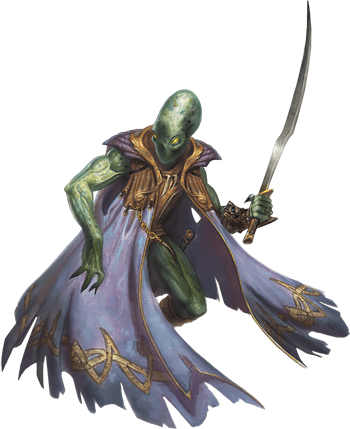 The most terrifying thing about a yugoloth is the innate evilness of their being. Countless stories like Star Wars and Lord of the Rings are predicated upon an idea that redemption is possible and that pity for a single wicked being can save the world. Such optimism has no place in an adventurer dealing with yugoloths. The only possible flicker of hope for a yugoloth aiding another is when it has something worthwhile to gain. In any other circumstance, even if the yugoloth stands to profit slightly, utter malice is the fiend’s modus operandi. If it came at the cost of causing good in the multiverse, such slight profit would be of no worth to a yugoloth.
The most terrifying thing about a yugoloth is the innate evilness of their being. Countless stories like Star Wars and Lord of the Rings are predicated upon an idea that redemption is possible and that pity for a single wicked being can save the world. Such optimism has no place in an adventurer dealing with yugoloths. The only possible flicker of hope for a yugoloth aiding another is when it has something worthwhile to gain. In any other circumstance, even if the yugoloth stands to profit slightly, utter malice is the fiend’s modus operandi. If it came at the cost of causing good in the multiverse, such slight profit would be of no worth to a yugoloth.
So, to adventurers that would hire a clever arcanaloth in order to defeat a cult of Tenebrous and save their homeland—or some other such virtuous act—must beware. Even if the money were good, the yugoloth would attempt to fulfil its contract to the letter of the law, then attempt to foil the act of goodness. The quickest way would be to immediately offer its services to the remnants of the evil faction it helped disband, spilling secrets it learned about the adventurers while in their employ. Even if a yugoloth doesn’t outright betray a virtuous employer, it’s certain to find a way to secretly twist its employer’s meaning to its own malicious ends. Of course, it would do this in such a way that it would seem unknown to its employer until after it was paid in full.
Unlike creatures like drow, orcs, and the other traditionally “evil” species in the D&D multiverse, whose evilness comes from cultures that prize selfish and cruel values rather than any internal evilness, yugoloths are avatars of the concepts of evil and neutrality. If a yugoloth were to become innately good—or even simply not evil, but true neutral—it would no longer be a yugoloth. It would cease to be a fiend and become some other sort of creature of neutrality and balance. To make a yugoloth’s cosmic nature as an evil spirit expressly clear to your players, consider incorporating these traits while in combat:
Highest Bidder. When a yugoloth recognizes that it’s fighting a losing battle (such as when half its allies are defeated, or its escape routes are blocked off, at the DM’s discretion), it offers the characters a chance to hire it instead of risking further injury in combat. Its price is equal to its challenge rating × 75 gp per day of employment, up to 10 days. This is a 25% discount over its usual rate, since it’s in dire straits. A character that makes a successful Charisma (Intimidation) check contested by its Wisdom (Insight) check reduces the price to its challenge rating × 50 gp per day.
Pragmatic Combatant. A yugoloth assesses combat situations evenly, choosing tactics that ensure its personal survival, even at the expense of its allies. Consider a yugoloth’s Intelligence score when deciding its tactics. For example, a mezzoloth with an Intelligence of 7 (–2) is pragmatic insofar as it tries to kill a single enemy as quickly as possible, without much mind for complex maneuvers. On the other hand, an ultroloth with an Intelligence of 18 (+4) stays out of the line of fire by using its Teleport or Hypnotic Gaze actions whenever enemies get too close, and using spells like wall of fire to keep its foes at bay.
How have you played yugoloths in your game? Do you have any stories of truly terrifying encounter with these fiends?
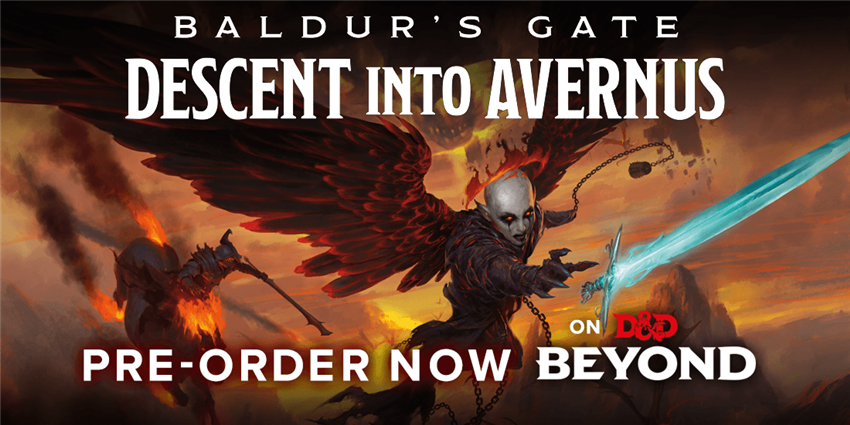
You can pit your characters against the forces of the Abyss and the Nine Hells in Baldur’s Gate: Descent into Avernus, now on the D&D Beyond Marketplace!
 James Haeck is the lead writer for D&D Beyond, the co-author of Waterdeep: Dragon Heist and the Critical Role Tal'Dorei Campaign Setting, a member of the Guild Adepts, and a freelance writer for Wizards of the Coast, the D&D Adventurers League, and other RPG companies. He lives in Seattle, Washington with his partner Hannah and their animal companions Mei and Marzipan. You can find him wasting time on Twitter at @jamesjhaeck.
James Haeck is the lead writer for D&D Beyond, the co-author of Waterdeep: Dragon Heist and the Critical Role Tal'Dorei Campaign Setting, a member of the Guild Adepts, and a freelance writer for Wizards of the Coast, the D&D Adventurers League, and other RPG companies. He lives in Seattle, Washington with his partner Hannah and their animal companions Mei and Marzipan. You can find him wasting time on Twitter at @jamesjhaeck.








-
View User Profile
-
Send Message
Posted Sep 28, 2019Yeah, demons would probably be too chaotic and animalistic to be redeemed, but devils are known to show mercy if it benefits them somehow, maybe a devil would evolve to not add contracts to it's mercy maybe giving it some kind of redemption point for each willing if unrealised good deed. I mean, aren't some devils originally human, and they could maybe purify their soul via this system, becoming a celestial with maybe a minor curse or something to mark it's change. Like if you find a devil there could be a 5 percent chance it used too be human.
-
View User Profile
-
Send Message
Posted Sep 28, 2019Idk, perhaps a demon could be risen by some sort of reverse Stockholm Syndrome. Like a paladin of Redemption captures a demon and is overwhelmingly Lawful and good to it, until the slightest evil or chaos causes it to switch sides to fight for right. It would be an interesting story idea. You'd probably have to raise a devil in the same way, as any good they do is simply to further an evil agenda.
-
View User Profile
-
Send Message
Posted Sep 29, 2019I don't think it would work with a devil either, devils could feign being good for a time just to get there way but would never be able to become a being of anything but evil
-
View User Profile
-
Send Message
Posted Sep 29, 2019I agree with you if we are talking innate nature. A devil must be Lawful Evil, a Demon must be Chaotic Evil, and a Yugoloth must be Neutral Evil. But I think its possible if there is an external force affecting them. Generally I would think it would need to be a powerful external force and if a change is affected the entity will no longer be the same. They may have a similar form but because of their innate nature changing they are now a different type of entity. A devil that had been converted to good would be an entity similar to an Angel, just as how Zariel was an angel that fell and became a devil.
-
View User Profile
-
Send Message
Posted Sep 29, 2019Exactly, if it became good it would no longer be a devil just like a good demon would no longer be a demon
-
View User Profile
-
Send Message
Posted Oct 1, 2019TL;DR: Devils embody Tyranny, demons embody anarchy, but Yugoloth embody sociopathy.
Also, I find it hard to believe that a yugoloth would turn down any amount of money just because they have to do a good deed to gain it. A being as selfish as a yugoloth wouldn't give two rats' asses about any sort of higher ideal, even evil. devils and demons might, but not yugoloth.
My very first time DMing was pitting a group of lv 20 mercenaries (the True Neutral variety of mercs as opposed to the variety Yugoloth embody) against a den of yugoloth (I figured risking "oops i accidentally put the party against a vastly underpowered enemy" was a better for a first-time DM than "oops I accidentally caused a TPK"), and I made a point that the merc company the players worked for was different from Yugoloth mainly in that if prospective employers had to worry about their super-expensive mercs turning on them as soon as their enemies offered a higher price, then they wouldn't freaking hire those mercs.
but more to the point, I told them that yugoloth would think nothing of working for their polar opposites, the guardinals, to exterminate another group of yugoloth, since Runesmith told me that that's how they operate.
I also told them (since that's what the internet told me) that fiends don't use mortal coins for money, since infinite planes with infinite minerals would mean infinite counterfiet coins, so they instead use larvae as money, which are the forms petitioners take upon dying and arriving at any of the lower planes, and which also pull quadruple duty as the various fiend's source of food, reproduction (devil turns larvae into lemures when it needs canon fodder, then from there into other devils when it needs real troops), and as spell components.
lastly, I told them that yugoloth were native to Hades and had simply moved most of their operations to Gehenna, since that's the official story on 1d4chan, and also because it makes more sense that way.
-
View User Profile
-
Send Message
Posted Oct 4, 2019So what would happen if, say, an Arcanaloth would turn Neutral Good. A good example is used below by other users. The Deck of Many Things. Maybe spells created by the PCs, divine intervention, wish, etc. All of those could very easily switch the alignment of a creature. What would your suggestion be in response to this? Would it become a celestial? Would it simply die? Or what could be very interesting, it became what it was before it was an Arcanaloth?
I also have a question about the transformation to fiends. If let's say, Silath Geldernarn. A Lawful evil tiefling wizard. He does evil acts, fully aware of it, and not giving a flying pile of burning... erh... chickens about it. If he were to worship Asmodeus, his soul would be thrown into the nine hells and he would rise as a Lemure. But if he did several evil acts, maybe even hired a Canoloth himself. Would he then be thrown to Gehenna? Or to Baator? And if he was without faith, he would end up in the Fugue Plan. Where Jergal sits. Waiting for the end in his bone castle. So is it up to the DM, or is there a specific kind of evil act that gets you to the specific plan. I assume that a chaotic evil person, has the exact same change to be thrown into Gehenna as Silath does. Right? Thanks in advance!
P.S: I love these articles. Keep making them! I love it!
-
View User Profile
-
Send Message
Posted Oct 7, 2019In my opinion I think the fiend in question should go through some kind of redemption phase, if it passes through this redemption phase successfully, it should maybe become some kind of celestial being. Of course, this would only work if the fiend in question used to be human before his/her soul became a fiend. Even then this is theoretical as there are no rules in 5e that I know of, I've only read the main three, but I think that should be able to happen as angels can in fact fall. fiends should have some fallen or redeemed state, maybe becoming a celestial with marks of its before now fiend hood status.
With your second question the question is if the chaotic evil person has sold his soul to some type of fiend. Also, you are forgetting that demons are chaotic evil, devils lawful evil, yugoloths neutral evil. would this affect what you become, or is it the plane. I honestly think its the fiend compared to alignment as your actions in life should be the same as your fiend. This would also simplify becoming a fiend through your soul as you would be able to become your fiend type quickly and easily, a chaotic evil human would become a mane. The books also say that a chaotic evil soul would become a mane. So I think that the planes have very little effect on soul to fiend transformation.
-
View User Profile
-
Send Message
Posted Oct 23, 2019Well, this becomes a matter of it turning either lawful or chaotic—both "equally opposed" to neutral demeanor—and unavoidably good—the exact opposite to its evil conviction, so…
I'd say it turns into goo and then reforms in Gehenna; utterly pissed by what happened to him, yet all the more savvy about messing with such a deck.
-
View User Profile
-
Send Message
Posted Oct 23, 2019Remember the fact the yugoloth are guaranteed to come back into existence on the home plane of Gehenna, doesn't take away the pain of dying—first discorporating and then dissolving into (material) "non-existence."
I can pretty much see veteran yugoloth going at great lengths to spare themselves the undoubtedly excruciating process, as much as they possibly can.
-
View User Profile
-
Send Message
Posted Oct 23, 2019That may be true, but the monster manual states that they fight without regards for there own well-being when anywhere ACCEPT ghenna, as they are permanently destroyed when killed on ghenna.
-
View User Profile
-
Send Message
Posted Nov 14, 2019This is an interesting article! Yugoloths would be interesting to use in a campaign.
-
View User Profile
-
Send Message
Posted Nov 14, 2019Accurate. I can testify, as a secret yugoloth.
-
View User Profile
-
Send Message
Posted Jul 27, 2020It’s seems weird that yugoloths home plane is Gehenna, the plane of NE and LE. Hades is the plane of pure neutral evil, it seems more... yugoloth-y
-
View User Profile
-
Send Message
Posted Dec 30, 2020"If a yugoloth were to become innately good—or even simply not evil, but true neutral—it would no longer be a yugoloth. It would cease to be a fiend and become some other sort of creature of neutrality and balance."
What about A'kin? Although he could be hiding his malicious nature, but why?
(From Planescape; Runs a shop in Sigil called the Friendly Fiend)
-
View User Profile
-
Send Message
Posted Dec 30, 2020There is older edition lore that the night hags who came to Geheena and made the Yugoloths received help from an older NE race, the Baernaloth. A working theory I have is that the Baernaloths had a hand in ensuring that Yugoloths would be native to Gehenna to make it harder to trace any connection between the two. But I don't really have any evidence for this.
-
View User Profile
-
Send Message
Posted Dec 31, 2020If he is running a shop he is probably hiding his nature, as to why, well its usually easier to interact with customers if you seem nice or at least reasonable. Just because a creature is evil doesn't mean they have to act evil if it doesn't suit there current needs. Some of the lore of Yugoloths suggests that they are capable of of feigning emotions to interact, or manipulate people. I decided to do a quick search of A'kin, and some Reddit users had interesting ideas of how to play him. Some played him as a straight up businessman, knowing that their players would become obsessed with uncovering a Yugoloth plot that wasn't there, some made him a middleman for various factions in Sigil, and some played him like Garak from DS9, an honest businessman who happens to have a wide array of questionable knowledge and is capable of putting the right words in the right ears to make something coincidentally happen.
-
View User Profile
-
Send Message
Posted Jun 12, 2021I'm running a campaign that takes place in Baator (the Nine Hells), and one of the possible guides the party may stumble across is a Merrenoloth (a Yugoloth ferryman), which they've hired for now, and it's a blast playing him. He's very friendly to the party, betting that they'll keep a lot of gold flowing, but he won't hesitate to sell them out if he thinks a rival will offer more than they can.
The campaign just started, but they might use his service for all 9 layers. I'm looking forward to seeing how it all unfolds.
-
View User Profile
-
Send Message
Posted Jul 12, 2021Honestly, I'm creating a whole game world around the concept that fiends don't have to be evil. There's no major stat change; they just have a different alignment.
Also, I purely did this concept after thinking 'hey, these look awesome, but I don't want them to be evil' a couple years ago and introduced it to my dad (he was the only other person I could play with), and then I kind of set a record of alignment changing.
-
View User Profile
-
Send Message
Posted Apr 1, 2022The idea that a Yugoloth would cease to be a yugoloth if its alignment changed sounds like inspiration for all you homebrewers out there. We need reformed celestial ex-yugoloths. I mean we don't but it would be a nice tool to have...